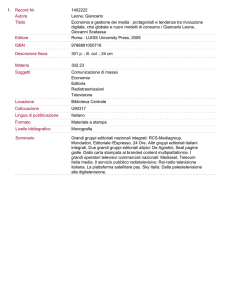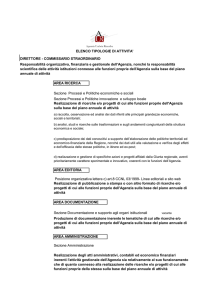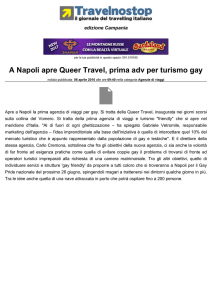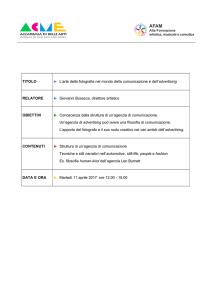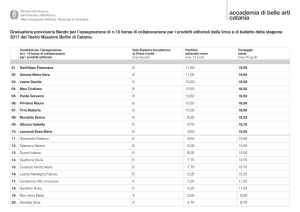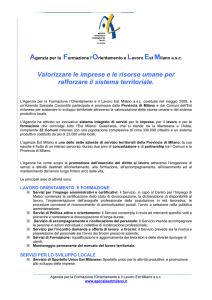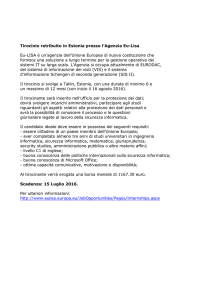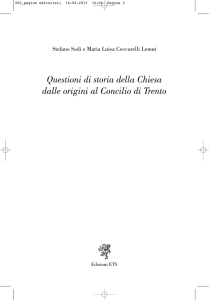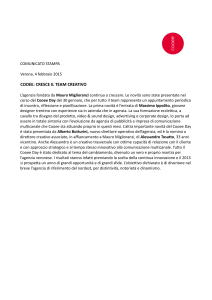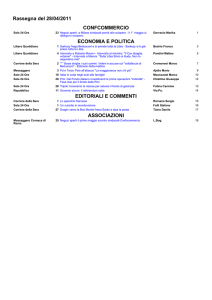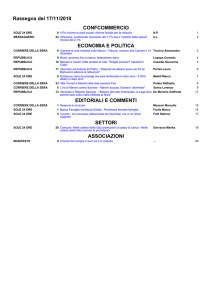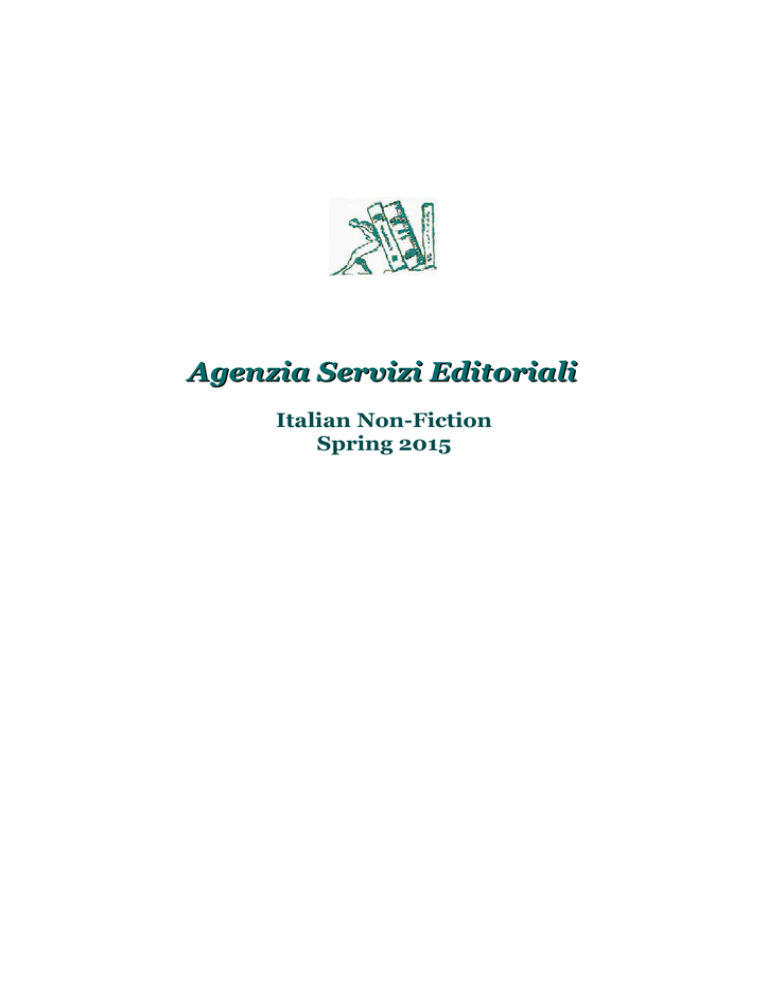
Agenzia Servizi Editoriali
Italian Non-Fiction
Spring 2015
Lauretta Colonnelli
La tavola di Dio
The Last Supper. What Jesus and the apostles ate and how
painters of all time imagined the menu. Pictures, recipes,
Heaven and Hell.
Edizioni Clichy 2015
250 pages - 12x19cm
12.75 euro
In which sauce did Jesus dip the morsel that offered to Judas? At that time the Last
Supper began? Who cooked it? Fish, lamb or pork? Roasted or boiled? White wine or
red wine? What hymns sang Jesus and the apostles after eating? Sitting or lying down?
Who paid the bill? How many Last Suppers with shrimp are represented in the
churches of Trentino? How many cherries Ghirlandaio painted on his Last Suppers in
Florence? Is it true that Leonardo was vegetarian? And why he filled with eels the dishes
of his Last Supper? Who was the only artist to portray the Passover? Why Judas is
dressed in yellow? And why has he reddish hair? What is the Renaissance Elbow? Where
the cats that appear under the table come from? How many minutes should the dough
of unleavened bread rest? Why crickets are pure? And why snails are not? How much
the portions of the sacred meal increased in the last thousand years? Who painted the
largest loaf ? Why almost all the artists filled with knives the table of Jesus? When the
first napkin in art history was painted on a Last Supper?
Art, food, history, faith. After the great success of her two volumes Conosci Roma?
Lauretta Colonelli takes us on an adventurous journey through the endless
representations of the Last Supper from the Florentine frescos to Leonardo, from
Giotto to Veronese, from Marc Chagall to Andy Warhol.
Born in Pitigliano (Grosseto), resident in Rome since 1969, after classical
studies Lauretta Colonnelli graduated in philosophy at the University
La Sapienza. She has worked at Rai as a program director, and then as a
journalist and editor of the cultural section in various weekly magazines
and daily vewpapers. Among her recent publications: the essay on "The
unique 60s in Rome" (ed. Skira, 2011) and the book "Been to Rome?"
(ed. Clichy, 2013): a walk through the secrets of the Eternal City told in
450 questions and answers.
Agenzia Servizi Editoriali
Goffredo Fofi
Cinema e anarchia
Elèuthera- forthcoming Fall 2015
Today more than ever, art is anarchy, otherwise it is cowardly or
servile.
While the power imposes globally a unique model of social organization, while media
and new technologies emerge as primary means of control, even art is forced to
reconsider its means and its ends, its very reason for existing. And if it is true that great
art has always shown an anarchist flair and a critique of the existent, to question directly or indirectly - the "rationality" of social order, the cinema has always had two
souls: one is that of peaceful consolation and the other is the questioning provocation.
And it is the latter which Fofi considers, showing how cinema has always explored
neither trivial nor comforting territories and languages. In this pamphlet great examples
are suggested of direct or indirect relationship between cinema and anarchy, that can be
traced both in the cinema of the past - in particular in the figures of two masters like
Jean Vigo and Luis Buñuel – and in recent movies, insisting first on the works by Aki
Kaurismaki and Daniele Ciprì and Franco Maresco, but also highlighting other authors
and works of different countries.
Goffredo Fofi (Gubbio 1937) has been involved in literary
and film criticism, has directed and founded cultural and
political journals, is the author of several books and has
participated in many experiences of social intervention and
education since the mid-fifties.
Agenzia Servizi Editoriali
Piero Cipriano
IL MANICOMIO CHIMICO
cronache di uno psichiatra riluttante
(The Chemical Asylum. Diary of a Reluctant Psychiatrist)
Elèuthera 2015
256 pp.
€ 15,00
It is not a coincidence that Cipriano is reluctant, that is – as the dictionary says - “unwilling to
give up, indulge, approve”.
Il Sole 24Ore
Today an asylum is no longer made up of bands, walls, bars, but it has become
untangible, invisible. It moved directly into the head, in neurotransmitter pathways that
regulate thoughts. The real madhouse, today, is made of drugs. Moreover, we are
experiencing a real anthropological change: for psychiatrists, and drug companies, the
number of sick people to cure is not enough, so they treat also the healthy. Grief,
sadness, anger, shyness, inattention, are not considered physiological feelings, but
diseases to be treated with appropriate medication. Cipriano submits to severe criticism
the key concepts of "modern" psychiatry: to begin with the diagnosis, or the
bureaucratic urgent need to consider "disease" any psychological problems, followed by
the inevitable prescription of a drug. And when drugs are not enough, there is a return
to the unofficial use of bands and electroshock. This is the new mental hospital, less
noisy, more discreet, where diagnosis and drugs dominate the scene.
Piero Cipriano (1968), psychiatrist and psychotherapist,
spcializing in cognitive psycology and ethnopsychiatry,
has worked in various departments of Mental Health of
Italy, from Friuli to Campania,and presently isangaged in
a SPDC in Rome. His previous book La fabbrica della cura
mentale, was published by Elèuthera in 2013.
Agenzia Servizi Editoriali
Franco La Cecla
Lasciarsi
Eleuthera 2014
Softcover
168 pages
15.00 €
The rituals of abandonment
in the era of social network
Small etiquette manual to say goodbye in the time of liquid love and sms
It seems that our society is unable to continue any relationship. In Europe, the “eternal
love” has lasted less than three years. Leaving or being left should therefore be a quite
trivial event, and yet it still makes us the protagonists of a drama that often we do not
know how to handle. There is widespread ignorance of the art of taking leave, even
more evident at a time when the farewells are mediated by cell phones, emails, sms. And
the appearance of the tragic end of a love affair lies in the disconnect between the
tangible feelings and the metaphysics of eternal love (and happy marriage), just
according to a Catholic and Hollywood's order, that still drives us to look for the
woman or the man of our lives. This is why every “lasciamento” must be immediately
removed, must be fast and cruel, and often sets free our “inner barbarian”: to start again
and persuade ourselves and others that the next will be the right time ...
Franco Cecla (Palermo 1950), anthropologist and urban planner, has
taught Cultural Anthropology at Berkeley, Paris, Venice, Bologna and
Milan.
Other books by Franco La Cecla
PER UN'ANTROPOLOGIA DEL QUOTIDIANO L'APE Antropologia su tre ruote SAPERCI FARE - Corpi e autenticità
MODI BRUSCHI - antropologia del maschio
MENTE LOCALE / IN ALTRO MARE - Per un'antropologia dell'abitare
UNA MORALE PER LA VITA DI TUTTI I GIORNI NON È COSA / NON SIAMO MAI SOLI - Vita affettiva degli oggetti / Oggetti e disegni
Agenzia Servizi Editoriali
Porpora Marcasciano
AntoloGaia
Vivere sognando e non sognare di vivere: I miei
anni Settanta
Edizioni Alegre 2015
272 pages
15 euro
"Amichessa, this is paradise: you eat, you drink, you fuck, you get drugs without the need
for money! And then
sea, sun and nudism. This is communism. "
Filling a void of the Italian "gay literature" Pospora Marcasciano tells her story and
through her biography, she describes the Seventies from a special pointof view. Her
experience is deviant and outrageous, an "uninterrupted crush", made up of events,
passions, fears, dreams and sexuality, in which she crosses many major and minor
characters, creats the first GLBT collective, the first Gay Pride and the nascent Gay
movement, enters into a relationship with the revolutionary movement of that decade,
helping militants to become aware of themselves and their bodies. A reality in which
trans, gay, lesbians, and women revolutionize their lives and consequently the world.
A "fabulous"story, that is tragically overwhelmed by AIDS and the description if the
virus as the "gay plague". From joyous, the atmosphere becomes gloomy and a sad
feeling of powerlessness invades the protagonists of that period, erasing the memory of
a decade. Until today, when everything seems to have been "normalized" by the market.
"Per trip intendo il viaggio che comprende tutto il mio percorso, quello che avevo cominciato nel settembre del 1973,
quando mi si spalancò davanti un nuovo mondo, quando cominciai a capire tante cose, a prendere coscienza, quando smisi
di vergognarmi e compresi che tutto quello che mi era stato detto fino a quel momento era falso. Gli indiani non erano i
cattivi, i comunisti non erano cannibali, gli anarchici non erano assassini e gli omosessuali non erano mostri, gli stronzi
che vorrebbero fartelo credere sono invece autentici: stronzi, veramente stronzi".
Porpora Marcasciano, the president of Mit (Movimento identità
transessuale), is the author of: Tra le rose e le viole – La storia e le storie di
transessuali e travestiti (Manifestolibri, 2002); Favolose narranti. Storie di
transessuali (Manifestolibri, 2008). Porpora has also contrbuted with her
works to: Porneia. Voci e sguardi sulle prostituzioni (Il Poligrafo, 2003); Altri
femminismi. Corpi culture lavoro (Manifestolibri, 2006); Oltre le monocolture del
genere (Mimesis, 2006); Gay. La guida italiana in 150 voci (Mondadori, 2006);
Transessualità e scienze sociali (Liguori, 2008). L’amore ai tempi dello tsunami
(Ombre corte 2014); Esquimesi in Amazzonia (Mimesis, 2014); Infiniti amori
(Ediesse, 2014), Elementi di critica trans (Manifestolibri, 2010).
Agenzia Servizi Editoriali
Cristina Morini, Paolo Vignola
Brief precarious dictionary
Piccola enciclopedia precaria
From the “Quaderni di San Precario”
Welcome to the jungle of precarious work!
Essay
pp. 240 • 2015
Twenty years of job uncertainty led to the nowadays endorsement of the Jobs Act by the
Italian government. When the process of job precariousness started, Gilles Deleuze said
that to face the control society “we don’t have to cry, or to hope, but to find new
weapons”. That’s what San Precario meant to do with its Mayday European
demonstrations, and with its small and big struggles in the territory.
This little encyclopaedia collects the headword of precarious jobs and life, together with
a sum of analysis aimed at giving to the readers all the theorical, legal and conflictual
instruments to face the dominant economy rules.
Cristina Morini, is a journalist of the review “Quaderni di San Precario”. She works on
feminism, social research, job changement. She wrote La serva serve, 2001; Per amore o per forza.
Femminilizzazione del lavoro e biopolitiche del corpo, 2010.
Paolo Vignola, philosopher,is the co-founder of the review “La deleuziana”, writes on
“Quaderni di San Precario” and colaborates with the Institut Recherche et Innovation di Parigi.
He published also L’attenzione altrove. Sintomatologie di quel che ci accade (2013).
Agenzia Servizi Editoriali
Claudio Bianchi
Continente Cina
Ibis edizioni
Essay
214 pages
2014
10 euros
What do we know about China, how it was and how it has become? The book is a sort
of “guided visit” to the big country, to discover its people, its history and present
situation. After a historical examination, the author analyses the present social, economic
and political situation. The ethnic divisions, religions, languages, but also Chinese
common life are described, as well as internal migrations, offering interesting and up to
date statistics about their typologies and geographic differences. In the second part,
there are some life experiences, told by Chinese people or people who worked in China.
Claudio Bianchi lives and works in Milan, He also published for Ibis: Giuseppe Gorani e la
brigata paesana (2010), Il Drago e il Biscione (2012), Continente Cina (2014).
Agenzia Servizi Editoriali
Marco Sioli
Expo d'America
From the Barnum exhibition to the global event
Ibis edizioni
Essay
316 pages
2014
13 euros
The Exhibition of the Industry of All Nations, held in New York between 1853 and
1854, was the first American world exhibition. It aimed not only at spreading
technological innovations and arts worldwide, but also to promote friendship and
solidarity amongst people. After a decline of the visitors, the exhibition was committed
to Phineas T. Barnum, the great showman who was trying to renew his image as a
successful
artistic
manager,
instead
of
the
well
known
barker.
This is the starting point of this essay on USA Expo, that examines the Centennial
Exhibition of 1876 in Philadelphia, the Columbian Exposition of 1893 in Chicago and
the Louisiana Purchase Exposition of 1904 in St. Louis, where also took place the first
American Olympic games. Amongst the halls there were stands dedicated to leisure: this
showed that the exhibition had overcome its original purpose to become a global event
which involved the entire nation, with the central role of its big metropolis and the rise
of mass culture.
Marco Sioli teaches History of North America at Milan State University. He published
also: American Golem. Lo spazio e il tempo degli Stati Uniti (2009). He edited Per l'abolizione
della schiavitù by Schoelcher Victor, Dalla Sicilia alle Alpi by Emerson Ralph W., Viaggio nel
sud della Francia e nel nord d'Italia by Thomas Jefferson.
Agenzia Servizi Editoriali
Sandro Chignola
Foucault oltre Foucault
Una politica della filosofia
DeriveApprodi 2015
208 pagine
14.45 euro
Studying Michel Foucault in his texts does not mean reconsider him as a philosopher. It
means rethinking the philosophy itself, the consistency and the alleged independence of
its archives, the limits within which it is bounded in the academic knowledge, and try to
contest them. Doing this does not mean, of course, abandon philosophy. What makes it
so available, on the contrary, is a movement of roundtrip between its interior and its
exterior; an exterior made of processes, practices, conflicts, on which we measure if
philosophy can face the challenge, its pace and its resilience. Foucault, in this view, can
be studied as a philosopher and at the same time as a radical opponent of the statute of
philosophy as knowledge. He offers us an example, one of the most radical of an
authentic political philosophy. A political philosophy which can break the torpidity of a
tradition, that of political philosophy in particular, and the separation between practice
and theory.
Sandro Chignola is professor of political philosophy at the
University of Padua and visiting professor at the Universidad
Nacional de San Martin (UNSAM) of Buenos Aires. He is a
member of the scientific committee of several magazines in Italy
and abroad. He writes on the cultural pages of "il manifesto." His
latest books are: Storia concettuale e filosofia politica (Angeli, 2008); Il
tempo rovesciato. La Restaurazione e il governo della democrazia (Il Mulino,
2011); Il diritto del comune. Crisi della sovranità, proprietà e nuovi poteri
costituenti (ombre corte, 2012).
Agenzia Servizi Editoriali
Lorenzo Declich
L'islam nudo
Le spoglie di una civiltà nel mercato globale
Juvence 2015
147 pages
14 euro
The Islamic identity, in the grinder of globalization, is being redefined. This book, in
between reporting and disclosure, descibes some surprising and unexpected aspects of
this process, finally focusing on the emerging "Islamic Market" whose effects on the
lives of individual believers and various Muslim communities are often disruptive. It is a
world of large multinationals who have discovered the deal the "next one billion
market," Islamic-style millionaires Hollywood productions islamizzanti and brokers from
all over the world engaged in bundling "Islamically correct" products or to struggle one
agaist the other, but it is also a worls made of "chicken-pigs ", suspicious certifications,
historic cities such as Mecca that are torn down and rebuilt from scratch to make room
for the business. The first victims of what in Europe and North America is often
perceived as a threatening Islamic invasion are the Muslims themselves who, increasingly,
are conceived and managed by the actors of the global market as dumb and manipulable
"Muslim consumers."
Lorenzo Declich, PhD in "Islamic civilization" has taught at the
Orientale of Naples and is an expert of the contemporary Islamic
world, collaborating with various journals and newspapers.
Agenzia Servizi Editoriali
Hezbollah: Storia del partito di Dio
Marco Di Donato
Mimesis 2015
228 pages
The book is designed as a reconstruction of the history of the Party of God from its
birth (1985) to the present days and more specifically until 2009, the year of publication
of the last official ideological manifesto available today. The work is conceived in order
to trace the evolution of Hezbollah contextualizing each time its actions and its visions,
by keeping as main reference the documents in Arabic language which were published by
the official bodies of the Party of God.
Marco Di Donato, graduated at the Faculty of Arabic-Islamic and
Mediterranean Studies of the L'Orientale University, Naples, with a
thesis on Islamist resistance movements. PhD in Political Science, Di
Donato is currently resercher at UNIMED - Mediterranean
Universities Union.
Agenzia Servizi Editoriali

